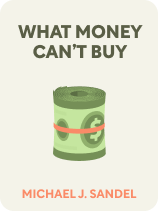

This article is an excerpt from the Shortform book guide to "What Money Can't Buy" by Michael J. Sandel. Shortform has the world's best summaries and analyses of books you should be reading.
Like this article? Sign up for a free trial here .
Is capitalism ethical? In what ways can economic-based incentives become dangerous?
Philosopher Michael Sandel believes that free-market societies cause corruption. In his book What Money Can’t Buy, Sandel argues that capitalist societies are unethical because they replace intrinsic motivations with economic incentives and cause the degradation of human virtue.
Here’s why capitalism is inherently unethical, according to Sandel.
Markets Corrupt Our Values
In his book What Money Can’t Buy, Sandel writes that market values have migrated out of their traditional economic sphere and intruded into other aspects of life—such as healthcare, education, family, law, justice, and democracy—where they are inappropriate. According to Sandel, the logic of the market—where supply and demand reign supreme above all other moral and ethical concerns—has overtaken older systems of values that held that some parts of the human experience were too precious to be bought and sold as commodities. This begs question, “Is capitalism ethical?”
| Is Capitalism the New Religion? Although Sandel doesn’t explicitly mention it, the idea that some elements of life and the human experience ought to be free from the invisible hand of the market often came from religious traditions like Christianity. These traditions—although frequently flawed in practice—taught that all human beings, endowed with an immortal soul, had an inherent worth and dignity that made them more than mere pawns in a global capitalist system. Today, some writers argue that, as religious faith and attendance at religious services has declined in the West, capitalism itself has become the dominant religion of the modern age. They claim that instead of finding deeper meaning in the rituals and sacraments of religion and spirituality, people today find that same sense of wonder in the workings of the market—the often-inexplicable rise and fall of stock prices; the creation of new products for consumption; and the mysterious forces behind inflation, recessions, and booms. These writers claim that the religion of the modern capitalist economy even has its own high priests and holy men in the form of economists, central bankers, and CEOs, who claim unique powers to interpret and direct the inscrutable forces of the market. |
| Turning Patients Into Consumers Sandel argues that the logic, incentives, behaviors, and psychology of the market have corrupted and intruded into previously non-market spaces. For an example of this dynamic in the real world, we can turn once again to the American healthcare system. As we discussed earlier, the US healthcare system is primarily private and for-profit. This is a significant outlier, as most other wealthy, advanced economies (like Canada, Australia, Japan, the United Kingdom, and France) have some form of universal, publicly-subsidized healthcare that provides access to doctors and hospitals free of charge. Critics of the American system argue that it forces market values and market-based decision making into medicine, a sphere where it is inappropriate, and leads to a moral degradation of the connection between doctors and patients. Such critics write that the relationship between doctors and patients ought to be a special bond—since patients are trusting doctors with their lives and the lives of their loved ones. But the intrusion of market dynamics into this relationship severs this bond—it turns doctors into providers and patients into consumers. Under this system, patients become nothing more than sources of profit for doctors and hospitals—who often extract that profit from them by ordering excessive and unnecessary care. Meanwhile, patients are encouraged to treat access to the healthcare system as just another consumer choice, no different from buying a car or a smartphone—they’re supposed to find out what care they need, shop around for providers, and make informed, cost-conscious decisions. Not only does this approach largely fail in practice (because patients lack the specialized knowledge needed to make informed decisions and are often doing so under deeply stressful circumstances), but it also reduces what’s supposed to be a special, almost sacred relationship between doctor and patient into a cold, calculating commercial transaction. |
The Commercialization Effect
It’s important to distinguish this objection—that applying market values inappropriately to areas of life such as family and education corrupts those areas—from Sandel’s earlier critique of markets as being unfair or exploitative. Here, Sandel argues that “fair” market conditions are irrelevant. Even if markets for certain goods, services, and experiences could be designed without inequality or exploitation, simply subjecting them to market conditions alters our attitudes toward them and degrades our collective moral and social wellbeing—forcing us to view them as mere commodities whose value is reflected in their price instead of having intrinsic, non-monetary value.
According to Sandel, this idea that distributing something through the market diminishes its value was first noted by economist Fred Hirsch, who dubbed it the “commercialization effect.” The commercialization effect is the theory that our feelings about a good or service vary depending on its means of distribution: whether it’s provided for money, or whether it’s free and supplied through goodwill, duty, a mutual exchange, or another reason.
Hirsch observed that the utility someone derived from a given good (in other words, the amount of satisfaction or happiness it gave them) diminished if it was acquired through ordinary market transactions. Gifts are a prime example of the commercialization effect. Someone who receives a gift (whatever the gift is) is likely to place a value on it greater than its pure market value because it symbolizes a deep emotional bond between them and the giver. But if the gift recipient simply purchased the item herself, its only value is what she paid for it—its acquisition through the market deprives it of a value it would otherwise have.
| The Psychology of Generosity Indeed, from the perspective of classical economics, behaviors like gift-giving are fundamentally irrational—the giver spends money on something and receives nothing of value, while the recipient may not even value the gift at all and derive no utility from it (if the item is something they don’t want). However, as we see above, Sandel and Hirsch argue that gifts intrinsically have more value than items we’ve purchased, and that purchased items are devalued thanks to their acquisition through the market. Supporting this idea, other writers argue that “irrational” economic transactions like gift-giving and other forms of generosity have significant social value on an evolutionary basis that they wouldn’t under “ordinary” market circumstances. In Influence, Robert Cialdini argues that acts like sharing and gift-giving gave a strong evolutionary advantage to early human communities by fostering tight bonds of social cohesion. Cialdini argues that reciprocity was the key. If another individual brought you some of their firewood, for example, it would behoove you to bring them some of your firewood—because doing so would help the two of you survive and make the overall clan or tribe stronger. This, in turn, created networks of obligation among early humans that made it easier for the group as a whole to multiply and survive. These networks of obligation enabled communities to divide labor, trade for scarce goods with their neighbors, create systems of mutual defense, and develop social hierarchies. In a harsh and unforgiving environment, like those many prehistoric peoples faced, this was the only way to ensure group survival and prosperity. Crucially, Cialdini argues, reciprocal gift-giving also lowered the cost of giving things up to your neighbors: You weren’t really losing something if you knew it would eventually come back to you. |
The Dominance of Incentives
Sandel further argues that market-based thinking has corrupted our values by replacing our intrinsic motivations with economic incentive-based motivations. When we act on intrinsic motivations, we do something because it is rewarding and satisfying for its own sake, not because of the promise of some external reward. Sandel writes that replacing intrinsic with extrinsic motivations weakens our connections to one another and makes our society more selfish, individualistic, and, ultimately, fragile.
In particular, Sandel strongly critiques the over-reliance on economic or financial incentives as the most powerful driver of human behavior. He writes that economists place too much stock in the power and significance of incentives, believing there is no problem great or small that cannot be solved with the proper incentive-based scheme. According to this standard economic model of human behavior, people are rational agents motivated almost entirely by self-interest. Therefore, if they are economically rewarded for engaging in socially “correct” behavior (or penalized for engaging in socially “wrong” behavior) they will align their behavior with their rational incentives.
But Sandel argues that such incentive-based thinking has expanded beyond the strict limits of the market to dominate all aspects of life—with incentives today governing our attitudes toward healthcare, education, and civic participation. It’s why, for example, some conservative economists are major proponents of turning certain government-provided social services like public education and healthcare into voucher programs: giving people a specified credit that they can use to purchase education or healthcare services from “vendors” of their choice, which will give those “vendors” an incentive to provide better services at a lower cost.
| Vouchers and Public Education Conservative economist Milton Friedman was a major proponent of vouchers, and he made his case for them using the same sort of incentive-based reasoning criticized by Sandel. In Capitalism and Freedom, he writes that vouchers—redeemable for educational services up to a certain amount for each child—would give parents the freedom to choose whichever educational option they deemed best for their children. He presents this voucher system as a superior alternative to what he sees as the government’s near-monopoly on education, which he believes traps children in poor communities in failing schools and provides counterproductive incentives for public school teachers and administrators. Specifically, Friedman writes that public schools receive guaranteed “revenue” that their “customers” are legally required to pay them in the form of taxes, regardless of performance. Teachers, like the school system itself, have few incentives to perform well because they are not paid more for producing better results. According to Friedman, vouchers would inject some much-needed competition into this “market” by depriving underperforming schools and teachers of their guaranteed revenue stream. With parents having greater freedom to choose where to send their children to school, market forces would introduce more efficiency into the system. Government-run schools that produced poor results would soon find themselves deprived of revenue (like any other seller that produced inferior goods), and ineffective teachers would find themselves out of a job. Over time, he writes, resources would flow to those schools that produced better results and away from those that didn’t. |
The Degradation of Virtue
Sandel argues that the spread of market-based values into the traditionally non-market sphere has corrupted human virtue. He writes that defenders of free markets treat virtues like altruism, civic pride, charity, and other moral sentiments as valuable—but limited—commodities. Because of their scarcity, they argue, we should limit our collective reliance upon these virtues and instead look to the rational workings of the market to allocate the vast majority of society’s resources. Thus, virtue is something to be rationed and expended only sparingly.
According to Sandel, however, virtues exist independently of the market. To treat them as marketable commodities is to weaken and diminish them. Sandel writes that virtue cannot be bought, sold, traded, hoarded, rationed, or manufactured out of nothing. Rather, it is cultivated within society through repetition on a mass scale. When we rely less upon moral, social, and civic virtues, we don’t “preserve” our stocks of them—rather, their very disuse depletes them.
| Altruism and Individualism Sandel writes that virtues like altruism need to be nurtured and cultivated on a mass scale, or we risk losing them altogether. This would imply that a more individualistic society (as most modern capitalist societies tend to be) would be less altruistic and more selfish. However, recent social science research suggests that the opposite may be the case—that highly individualistic cultures are more generous and altruistic than collectivist societies. One 2017 study of people across nearly 80 countries spanning half a century’s worth of data showed a sharp trend toward individualistic values, with researchers concluding that individualism has risen by 12% since the mid-20th century. They attributed this change in attitudes to rising wealth and the growth of free markets over the past 50-60 years, which has given people greater financial freedom to make their own choices without having to rely on traditional and local hierarchies and kinship groups. Despite this rise in disposable income and individualistic attitudes, however, altruism has increased with individualism, with the world’s five most individualistic countries all ranking among the top 10 globally for generosity (defined as giving help to strangers). One possible explanation suggested by these social science researchers is that while people in more traditional and collectivist societies do indeed value generosity and altruism, it is heavily weighted toward one’s own family or broader kin group. This would perhaps explain why China, which is both ruled by a communist government and strongly rooted in Confucian virtues of generosity, ranks low on the World Giving Index (at 140th place). |
| Shortform Example: Paying for Civic Participation To explore how the market can corrupt our virtues, let’s construct a hypothetical. Imagine a society where people only participate in the basic functions of democracy and civic life—like registering to vote, casting a ballot, or attending a school board meeting—if they are paid to do so on a contractual basis. Perhaps there’s even a price system that assigns a value to each of these functions: $500 to register, $300 to vote, $800 to show up at a school board meeting. Defenders of the market system would find little objectionable in such a setup. They would argue that the involvement of market incentives would do nothing to change this society’s civic character: Democracy will continue to function whether people participate in it for free or for a price. But, according to Sandel, something irretrievable would be lost: the virtues of civic pride and democratic participation that are essential to the functioning of a free society. The exercise and practice of these virtues would become hollow: Citizens would have a fundamentally different attitude toward their civic obligations, seeing them as a source of profit rather than something that ought to be done for its own sake. By replacing such vital democratic functions with transactional market incentives and payoff schemes, the citizens of such a society would come to place little intrinsic value or sense of ownership in their own institutions of self-government—beyond those that were monetarily compensated for. Sandel writes that while these virtues don’t have a price or a market value, they are all but gone when they are allowed to languish through neglect. |

———End of Preview———
Like what you just read? Read the rest of the world's best book summary and analysis of Michael J. Sandel's "What Money Can't Buy" at Shortform .
Here's what you'll find in our full What Money Can't Buy summary :
- How market values are corrupting society's morals
- Why markets lead to the inequitable distribution of essential goods, services, and experiences
- A look at the massive impact of living in a market society






